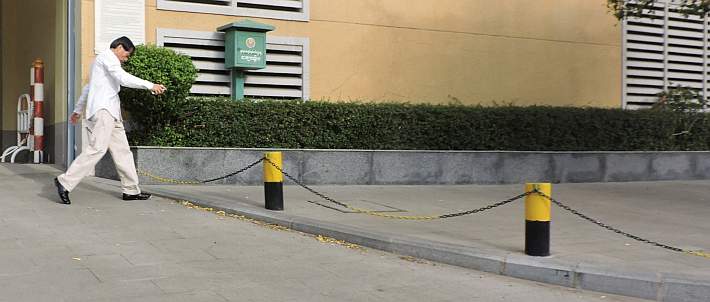
Watch your step!

Charlie Dittmeier's Home Page


Unfortunately too much of life in Cambodia comes down to money. Not much happens here without money–often LOTS of money–being part of the deal. Cambodia is moving from a developing country into the lower middle income bracket and that generates lots of opportunities for gifts and bonuses and outright graft. The prime minister is known by some business people as Mr. Ten Percent. Things that would be free of commercial taint, like traffic signs in other countries, become income generators here.
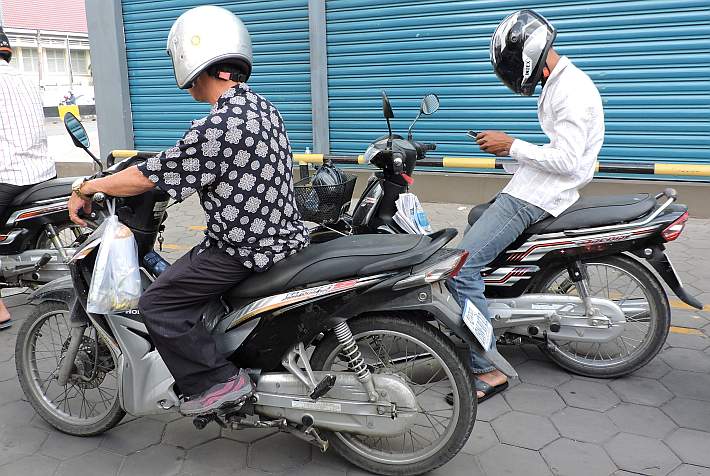
Khmer Times (newspaper): What kinds of vehicles cause the most traffic accidents in Cambodia?
Colonel Visal (Chief of the Traffic Police Office): “Causing the most accidents is motorbikes, including the ones used to drag a cart and tuk-tuk. Accidents caused by motorbikes account for 70 percent of all accidents in Cambodia. The new law states that motorbike drivers whose rides are 125cc or less will no longer need a license, yet our statistics prove that it is that kind of rides which cause most of the accidents in the country.”
Cambodia averages five or six traffic deaths a day, with many more injured. The government’s response? Eliminate the need for a driver’s license for the largest category of vehicles (by far) on the road. It makes the locals happy because they don’t have to pay for the test and bribe the test official, and it makes the government happy because it gains them votes. It’s like, in the United States, if the government said that no driver licenses would be needed for any vehicle selling for under $40,000.
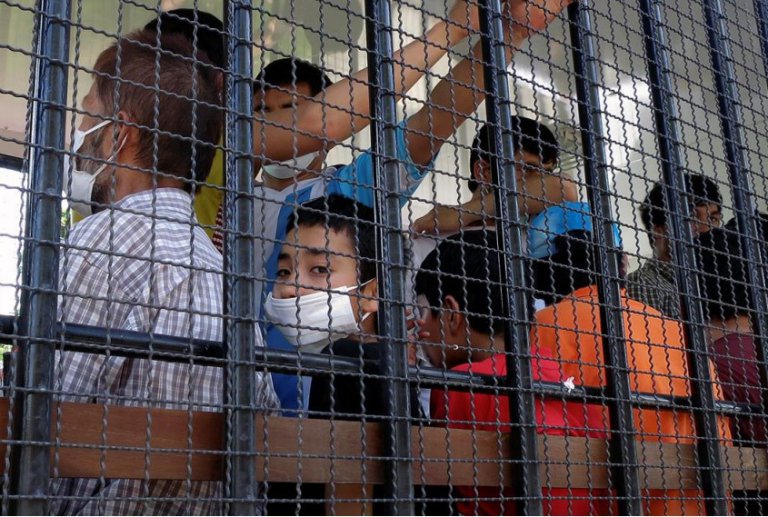
Religious persecution has driven many Pakistani Christians out of their home country. Many of them have come to Cambodia and ask for help from the St. Vincent de Paul Society in our English parish. Here is an article from UCAN that describes their journey and constant fear.
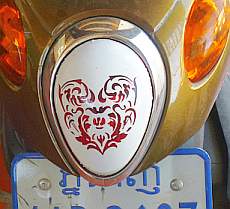
The government regularly talks about traffic safety but does little. It is especially remiss in enforcing the minimal traffic and vehicle regulations the country has. Click here to see one example.
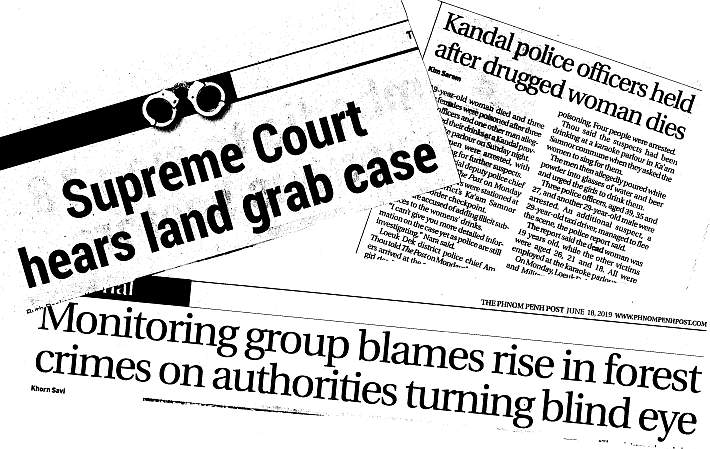
The number of headlines in the newspapers that allege illegal and immoral activity on the part of officials here is amazing. These are three headlines I cut out of newspapers today. In case there’s any doubt, the Supreme Court headline is about officials grabbing poor people’s land. There seems to be something in Cambodian culture that encourages elected and appointed officials to see themselves as above the law and presented with an opportunity to enrich themselves at the expense of the common people. Of course it’s not all officials, but headlines like these are a daily occurrence, pointing out the misdeeds of ministers, the police, the military–anybody with authority.
There was an article in the international press today about US governments taking measures to prevent farmland in the United States from being owned and controlled by foreign governments and entities. The US is probably taking those steps because of China’s aggressive policy of buying not just the crops from other countries but their natural resources and the land itself.
Cambodia is experience a devastating invasion by China and Chinese nationals. Every day there are articles in the papers about land values increasing beyond the reach of locals; neighborhoods and whole towns being changed by the influx of Chinese business people and tourists; the rates of crime going up because of Chinese gangs and criminal activities; etc.
This is all backed up by personal stories of the people we encounter in our mission work, people who have been negatively affected and displaced by the Chinese.
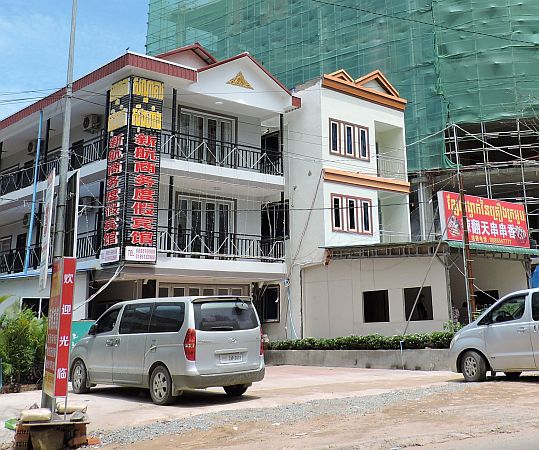
Notice how every sign now has Chinese characters. It has become so common and so blatant that the Cambodian government has now ruled that all signs, first of all, must HAVE Khmer lettering (some were only in Chinese), and secondly, that the Khmer letters must be approximately twice the size of the Chinese characters.
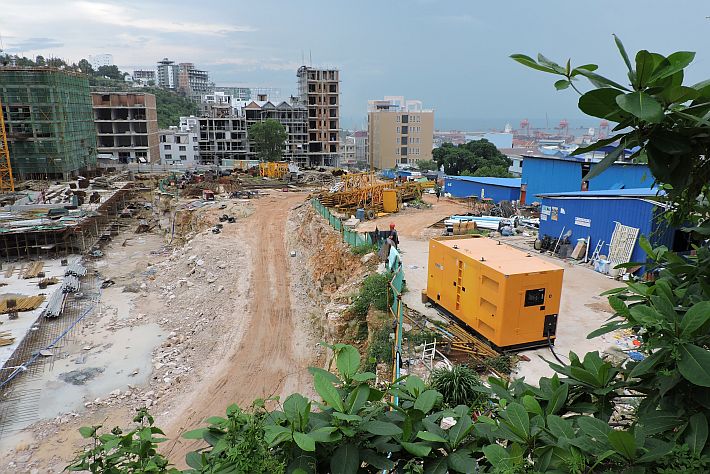
This is a view from the hilltop where the Catholic church center is located in Sihanoukville. In previous years this view was of trees. Now they are gone. Basically all of the buildings visible here have sprung up since our retreat a year ago.
In going to Sihanoukville for the priests retreat, the Chinese presence and influence was most obvious: • On the bus ride to Sihanoukville, the passengers across the aisle were speaking Mandarin. • We have too many priests for the rooms at the church center so in previous years the overflow stayed at the Salesian Priests training hotel twenty minutes away. Because of the increased traffic and congestion from construction, it now takes an hour to get to that site so our priests stayed in hotels–new and probably Chinese-owned–near the center. • The Salesians had a restaurant and gelato shop in central Sihanoukville. This year the rent was raised from $400 a month to almost $4,000 as the Chinese buy up everything in sight. The Salesians closed their shops where they had trained local youth. • The local people have been moved far outside the city, away from their jobs, as the Chinese buy up apartments and neighborhoods and raise the rents. • During the retreat I went to buy a Coke at a shop near the church. The shop is new and no one in the shop spoke English or Khmer, only Mandarin Chinese. • A local English newspaper is now producing a Chinese-language insert. • Construction is occurring everywhere and causing shortages of water and electricity. • The construction doesn’t benefit the locals. The construction companies are Chinese and they bring in their own workers. All the salaries, etc., go back to China. And the list goes on and on.
China now owns Cambodia and the government doesn’t complain because China gives them $600,000,000 a year no strings attached. (You can guess which pockets that goes into.) In return Cambodia supports China in international disputes, such as concerning the islands in the South China Sea.
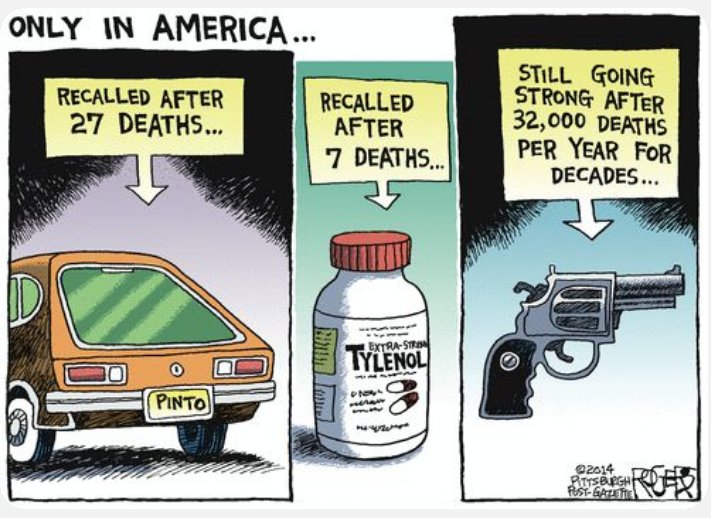

The headline “NGO says 60% of three to five-year-olds not schooled” is an indication of the poor state of Cambodian education. Cambodia has made significant progress over the last twenty years in reducing the number of eligible children not in school, but this week Save the Children published its global report on education with some terrible statistics for Cambodia: [1] 22.5% of children of primary and secondary school age are out of school; [2] 60% of pre-school and kindergarten-age children are not receiving any formal education; and [3] only 0.3% of the Ministry of Education’s budget was allocated for early childhood education.

This is a typical municipal building–maybe the equivalent of a county courthouse in the United States–located in Kampong Thom Province. There isn’t too much to these structures, just two closed offices, one on each side, and an open meeting area in between. This municipal building might be unusual because there’s a car parked there.